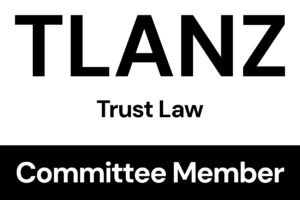Qualifications
- LLB (First Class Hons), BCS, University of Waikato 2012
- Admitted to the Bar in New Zealand 2013
Community & Industry Activity
- Member of the Law Association of New Zealand Trust Law committee

Contact
- DDI: +64 7 570 0687
- M: +64 27 464 2966
- E: rebecca.steens@hobec.co.nz
Rebecca is an estates, trust and elder law specialist. With a background in contentious trusts and estates, Rebecca brings a unique and practical perspective for her clients.
Rebecca advises on:
- Estate Planning – Wills, Enduring Powers of Attorney, Advance Care Plans & Living Wills
- Estate Administration – Probate, Letters of Administration, Letters of Administration with Will Annexed, Exemplification of Probate, Reseal of Probate, preparing Deeds of Family Arrangement, supporting executors in contentious estates
- Trusts – formation and administration including facilitating AGMs, reviewing and updating trust deeds and memorandums of wishes, making applications to the High Court for variations to trust deeds, advising trustees of their obligations and where necessary making applications for directions to the High Court, advising Beneficiaries of their rights, considering the overall purpose of having the trust (including creditor protection, succession, tax issues) and facilitate wind up
- Elder Law – advising on the use of family trusts, Wills, Enduring Powers of Attorney, working with medical practitioners
- Occupation Right Agreements (aka Licence to Occupy) – regarding Retirement Villages or Rest Home Care Units
Prior to joining the succession and estates team, Rebecca had 8 years of experience in estate and trust litigation, including four years at an Offshore firm in Jersey, in the Channel Islands. Rebecca has brought this experience back to Tauranga and works closely with Holland Beckett’s family and litigation teams.
Rebecca is a Tauranga local. Outside of work she enjoys spending time with her young family and getting outdoors to cycle and run.
Rebecca Steens's Expertise
Rebecca Steens's News & Resources

Update to Probate Threshold amount
Effective 24 September 2025, the threshold for informal administration under the Administration Act 1969 has increased from $15,000 to $40,000. This long-awaited change (which had not been updated since 2009) brings significant relief for families dealing with modest estates.
Administration without a Grant from the Court
The increase in threshold allows certain financial assets to be released when someone dies without requiring a formal grant of probate or letters of administration.
The process is governed by sections 65(2) and 65(5) of the Administration Act 1969 and applies only to specific institutions and asset types.
What assets are covered?
The new $40,000 threshold applies to financial assets held by:
Superannuation fund trustees
Societies
Banks
Employers
Local authorities
Trustee corporations
Kāinga Ora
ACC
MSD
The Crown
These institutions may release funds without probate, provided they are satisfied the owner has died and the recipient is one of the eligible persons listed in section 65(2)(a)–(e).
Life insurance policies under section 65(5) are also covered by the new threshold.
What is not covered?
The increase does not apply to:
Shares and debentures (threshold remains $15,000)
Non-financial assets such as real estate, vehicles, jewellery or artwork
Cryptocurrency, as exchanges are not listed institutions under the Act
If these assets are involved, a formal grant is still required.
Does it apply to deaths before 24 September 2025?
Yes. The Act specifies that the new threshold applies regardless of the date of death, as long as no grant has already been issued. Families may choose to wait until after 24 September 2025 to benefit from the new threshold.
Checks and balances
Institutions retain discretion and may refuse informal administration. Policies vary and may evolve in response to the change. Practitioners should be aware that institutions are protected under section 65(6) for payments made in good faith.
Funeral expenses: are they extra?
No. While banks may release funds directly to funeral directors, this is not added to the $40,000 threshold. The prescribed amount is assessed as at the date of death.
What does this mean for you?
If you are managing a loved one’s estate, or advising on estate planning, the higher threshold may offer a simpler and faster pathway where assets are modest. It may also reduce legal costs in some cases, while also reducing the administrative burden on the High Court.
However, it remains essential to have a valid Will and proper estate planning in place – especially as more estates are growing in value or involve trusts, cross-border assets or complex family structures.
If you are unsure whether a grant of administration is needed, our succession and estates team is here to help.

September is Wills Month.
A Will is perhaps the most important piece of paper you can leave behind to support your loved ones. Why do you need a Will, what happens if you pass without a Will, and how best should you prepare your Will for your circumstances?
Download our Wills Month Information Pack.
September is Wills Month.
Holland Beckett take part by offering a free Simple Will, or a 20% discount on a Complex Will, if you leave a gift to charity in your Will this September.
Speak to the Holland Beckett Succession and Estates team about Wills Month and what charity giving options would best suit you.
Contact the team on estates@hobec.co.nz or call our offices on 07 578 2199.

Why you need a Will now more than ever
In today’s evolving financial and legal landscape, having a valid Will in place has never been more critical for New Zealanders. The absence of a Will can lead to unnecessary delays, stress, and cost for families.
One of the most overlooked reasons to have a Will is KiwiSaver. Many people assume their KiwiSaver balance will automatically pass to their partner or next of kin on death, but that’s not how it works. KiwiSaver funds are held solely in the name of the individual and do not pass by survivorship (think, property held as joint tenants). Instead, they must be dealt with as part of the person’s estate, and if there is no Will, this creates delays and uncertainty in accessing those funds. With the recent Government budget injecting more incentives and support into KiwiSaver, balances are likely to grow significantly over time.
Another relevant factor is the probate threshold. Currently, assets over $15,000 will require a grant from the Court. This threshold is due to increase to $40,000 in the September 2025 to better reflect current asset values. In real terms, the threshold is easily exceeded - especially when you consider KiwiSaver.
Without a Will, for which the Court can grant “probate”, family members must apply for “letters of administration” which can be slower and more complex, particularly when family dynamics are tense.
At the same time, more New Zealanders are choosing to own property as tenants in common rather than joint tenants - especially in blended families or where people wish to protect their children’s inheritance from a new partner. This structure allows each party to leave their share of the property to whomever they choose, provided they have a Will to specify that. In this situation, a Will should complement any Contracting Out Agreement (or “Pre Nup”).
Many family trusts are now being wound up or simplified due to changes in trust law, compliance costs, aging/migrating settlors and international beneficiaries (giving rise to tax implications). As assets come out of a trust and revert to personal ownership, they become part of a person’s estate and must be carefully dealt with by their Will.
Overseas properties, investments and digital assets can be challenging to deal with if someone passes without a Will (or Wills) to reflect what should happen to assets in other countries.
Having a Will is no longer just about passing on the family home - it’s about ensuring some thought is given to the increasing complex assets and arrangements of the modern estate. With the right guidance, a complicated situation can have a clear and manageable solution. The key is to decide what you want to achieve, and get a Will drafted to reflect that.
Holland Beckett’s specialist succession and estates team provide expert advice on succession planning and can help to create a Will that best reflects your individual situation.
This article was first published in the New Zealand Herald and Bay of Plenty Times, July 2025.

Gift vs Loan – What’s the difference and why it matters in Estate Planning
It is common for parents to help children financially - whether it is a deposit for a first home, help with debt, or business support. However, when that money changes hands, it is important to be clear: was it a gift or a loan? This simple distinction can have significant legal and financial consequences, especially when it comes to estate planning.
What is a Gift?
A gift is a transfer of money or property made with no expectation of repayment. In legal terms, once given, the money no longer belongs to the giver.
Key features of a gift:
It is unconditional.
There is no written or implied agreement for repayment.
The recipient is free to use it however they like.
It can affect future Family Protection or Relationship Property claims.
It can affect the ability to qualify for residential care subsidy or other Government support.
Family relationships
Care needs to be taken where you are gifting money to your child and their partner, such as to help them into a property. Should that relationship break down, the partner would not necessarily be required to pay back any portion of the gift, therefore walking away with half of the gifted money.
Dealing with banks
If you are taking out a mortgage or loan with a bank, gifting certificates are often required where a family member is advancing a portion of the purchase price. This is so the bank isn’t in competition with anyone to get their money back should the bank loan end up in default. There are ways to record this on terms acceptable to the bank, while also protecting the advance. The document needs to be worded in such a way that doesn’t impede on the banks rights to be “first in line”.
Estate implications
If you have made significant gifts during your lifetime, this can reduce the assets available in your estate. If you give more to one child than another, it could cause disputes or be challenged under the Family Protection Act 1955 by children who believe they have not been adequately provided for.
What is a Loan?
A loan, by contrast, is money given with the expectation it will be paid back, either on demand or on agreed terms.
Key features of a loan:
It may be interest-free or interest-bearing.
There is usually some record of it (e.g. a loan agreement or promissory note).
It may be repayable on death or earlier.
It can be secured (e.g. against property) or unsecured.
Better protection
A loan provides protection in the scenario where you are advancing money to your child and their partner. If this relationship later breaks down, you can “call up” the loan and have this paid back. You can then re-lend the money to your child once the separation is complete for another purchase, if you choose to. However, as noted above, when banks are involved they will usually not allow a loan with interest or a specified repayment date, as this can affect the banks priority if the loan is defaulted.
Estate implications
A properly documented loan becomes an asset of your estate. Your executors can call the loan in after your death. This is especially useful if you want the amount to be eventually divided fairly among all children but are happy for one child to have the benefit of it in the meantime.
Beware of time limits under the Limitation Act 2010
If a loan is not properly documented, or if there is no clear date or mechanism for repayment (such as being repayable “on demand”), you run the risk that the loan becomes unenforceable over time. Under the Limitation Act, the right to enforce a debt usually expires six years after the cause of action arises. If the loan is repayable on demand, that six-year period may begin as soon as the money is transferred - unless otherwise specified. To protect your estate, it is important that any loan agreement includes clear repayment terms and triggers for demand, to ensure it remains recoverable.
Why the Difference Matters
Failing to document whether financial support was a gift or a loan can lead to:
Disputes between siblings over whether the recipient should get more than others.
Relationship Property claims, especially if a child separates and their partner claims half of what was received.
Unintended tax or trust consequences, if the money was meant to be protected.
Expired claims, if the estate cannot legally recover the loan due to limitation periods.
How to Protect Your Intentions
Document it clearly: Use a deed of gift or a formal loan agreement. This helps your family and your executors understand your intentions.
Include repayment terms: Clearly outline when the loan is due, how it can be demanded, and what triggers repayment - this avoids limitation issues.
Consider your Will: Your gifting or lending decisions can affect what is in your estate - make sure your Will aligns.
Talk to a lawyer: A small amount of advice now can save thousands in legal fees (and family stress) later.
Whether you are helping your children financially now or planning for what happens after you are gone, be clear about your intentions. A well-planned estate not only protects your assets but also your family relationships. If you are unsure whether past financial help was a gift or a loan - or you want to formalise it - talk to the Holland Beckett Succession and Estates team.
This article was first published for First Mortgage Trust, July 2025 newsletter.

Can I Disinherit My Children?
Many people assume that writing a Will gives them absolute control over who receives their property when they die. While that’s largely true in principle, New Zealand law imposes limits on testamentary freedom - particularly when it comes to children and other close family members.
If you are thinking about leaving a child out of your Will, it is important to understand what the law allows, what risks you may be taking and how you can best structure your estate planning to achieve what you want.
What does it mean to disinherit a child?
Disinheriting a child means deliberately choosing to exclude them from your Will - leaving them nothing, or only a token gift, in favour of other beneficiaries such as a spouse, a charity, or another child. This might be because of estrangement, past conflicts, financial independence, or other personal reasons.
Can I disinherit my children?
Yes, you are allowed to make a Will that leaves your assets to whoever you choose. However, that decision can be challenged after your death if the law finds that you failed to meet your obligations to your children.
In New Zealand, the key legislation that allows Wills to be challenged is the Family Protection Act 1955 (FPA).
What is the Family Protection Act 1955?
The FPA gives certain family members - including children of any age - the right to challenge a Will if they believe the deceased failed to make adequate provision for their proper maintenance and support.
This does not mean children are automatically entitled to a share of your estate. However, it does mean that if you exclude them, a Court will consider whether that exclusion was appropriate, given the circumstances.
Who can claim under the FPA?
Spouses and civil union partners
De facto partners
Children (including adult children)
Grandchildren (if their parent is deceased)
Stepchildren (in some cases)
Parents (only if the deceased left no spouse or children)
What will the Court consider?
When deciding whether a parent has breached their moral duty to a child, the Court looks at a range of factors:
The size of the estate
The child’s financial needs and circumstances
The relationship between the parent and the child
Any contributions the child made to the estate
The needs and claims of other beneficiaries
Whether the child was supported or gifted during the parent’s lifetime
Importantly, being estranged or financially independent does not automatically disqualify a child from succeeding in a claim.
If the Court can just step in, then does disinheritance ever succeed?
Yes - there are cases where disinheritance has been upheld by the Courts, particularly where:
The child is financially well-off, and the estate is modest
The relationship was seriously broken, and the parent had good reasons for exclusion
The parent has clear documentation explaining the decision
Other beneficiaries (e.g. a surviving partner or dependent child) have stronger moral claims
But there are also many cases where Courts have re-allocated estates, awarding disinherited children a portion of the assets because the parent’s Will failed to meet their legal duties.
What about Trusts or gifting assets before death?
Some people try to avoid FPA claims by transferring assets into Trusts or giving them away before death. These strategies can work - but they come with risks:
If challenged, they may trigger litigation under other laws (e.g. the Property (Relationships) Act 1976 or Law Reform (Testamentary Promises) Act 1949)
Trusts must be carefully structured to avoid sham arrangements
It is essential to get advice before taking these steps, as poorly executed strategies can lead to costly and protracted disputes.
Get advice
If you are considering disinheriting a child, you are best to get advice from a lawyer specialist in this area. Best practice in this situation would include the following steps:
Clearly record your reasons in a written memorandum to be stored with your Will
Consider leaving a modest legacy to the child to reduce the likelihood of a claim
Avoid emotional or vague explanations - focus on objective factors
Ensure your Will is up-to-date and properly witnessed

Succession planning for your digital assets
As we have moved into a more digital age, consideration should be made as to what happens to your digital assets when you die.
Increasingly, people are amassing both personal and business digital assets that have value – let’s not forget about James Howells who has spent a considerable fortune trying to dig through a Newport landfill site to find his private access key for his Bitcoin, which is now worth a whopping $800m.
So, what are your digital assets, what happens to them when you die, and how can you make sure they are not lost?
Your digital assets, which may have more value than others, include:
Digital assets on computing devices;
Financial accounts, including online gaming accounts, Bitcoin or other cryptocurrency wallets, and FOREX trading accounts;
Digital books, music or video streaming;
Cloud storage accounts;
Payment services;
Social media accounts used for marketing or advertising, loyalty programmes and any other;
Computer programmes directly installed onto a computer or provide the software as a service;
Intellectual property;
The infrastructure of an online business – websites and blogs;
Customer management services that manage mailing or newsletter descriptions.
You may also have assets of sentimental or other value such as photos, family trees (ancestry.com), or emails.
The best thing you can do is consider what you wish to happen to these digital assets and make provisions in your Will as to who has the right to access your digital assets, either stored on your computer, phone or that exist online, to amend or remove any profiles and provide any other notifications as required. Provision should also be made in your Will as to where all of the details of relevant passwords and logins are contained. It is therefore important to have a “password safe or manager” that stores and encrypts a list of passwords and user names for all online assets with the master password either provided in a sealed envelope with your Will or some other way with your Executors.
In addition, many online providers have their own policies as to what happens when you die and the rights to those digital assets will vary from provider to provider – for example, Facebook allows people to turn a deceased profile into a memorial page and Google allows you to plan ahead and appoint inactive account managers who are notified if the account is inactive for a certain period of time or you can choose to have the account deleted entirely.
Speak to your legal advisor about a specific clause in your Will relating to digital assets and what you would like to achieve. This clause should cover whom you wish to leave your digital assets to, what that includes and any appropriate login data.

Life Interest Wills
Mirror Wills
In a typical, nuclear family structure, it is common for a couple to leave their entire estate to each other, and for their Wills to provide that after they have both died the family estate will go to their children. This is commonly known as a mirror Will.
In the modern age, however, blended family structures are becoming increasingly common. If you have children from a previous relationship, you may find yourself stuck between wanting to ensure your children are provided for, and also ensuring your partner is looked after when you die.
If a couple is comfortable relying on their new partner to provide for their respective children in the surviving spouse or partner’s Will, a mirror Will could still be used. However, these Wills do not create a legally binding agreement between couples. Either spouse or partner is therefore free to change their Will at any time during their lifetime. These Wills frequently result in claims against the estate made by the deceased spouse or partner’s children from a previous relationship.
Mutual Wills
A mutual Will is another available option. A mutual Will is a mirror Will signed alongside an agreement between the respective Will-makers that they will not amend the terms of the Will in a way that will worsen the position for their stepchildren. While mutual Wills are effective for protecting the interests of both partners’ children, they are restrictive on the surviving partner and can be difficult to enforce.
To help avoid the risk of claims against your estate, and to offer peace of mind, a life interest Will may provide the answer.
Life Interest Wills
In your Will you can grant to somebody a life interest in an asset, giving that person the right to use that asset for the rest of their life. On their death, the asset will pass to the people named in your Will.
Life interests may be granted in:
Your entire estate;
Specific assets e.g. family heirlooms;
Real property e.g. the family home; or
A right to receive income from estate property e.g. bank account, shares or other investments.
A life interest can be a good way to provide for your partner, while still ensuring the asset will eventually be given to the named beneficiaries, usually your children.
A common example is where a person provides a life interest in the family home to a spouse or partner, and once their spouse or partner dies the family home will pass to the Will-maker’s children. Often the couple will own the family home in equal shares. This allows each of them to deal with their 1/2 share in their Will in the way they choose.
A life interest Will provides a basic level of asset protection. Any assets subject to a life interest will be held by the trustees appointed in the Will and do not legally belong to the person with the benefit of the life interest (such as the surviving spouse or partner). It can therefore provide peace of mind to the Will-maker that all of their loved ones will be looked after.
On the other hand, a life interest can be restrictive for the surviving spouse or partner. The surviving spouse or partner effectively loses control over assets that they may have considered to be theirs if they were used by the couple to benefit both of them. Any dealings with the asset will require the trustees of the Will to consent, and will be subject to the terms of the life interest in the Will. Issues can also arise if the circumstances of the surviving partner change, for example, if they need to go into care or move into a retirement village. A life interest Will can also mean the children may not see their inheritance for many years.
Holland Beckett’s succession and estates team is here to discuss your particular circumstances to determine if a life interest Will is right for you.

Bequests and Gifts to Charity in Your Will
Have you considered what will happen to your loved ones and the causes you care about after you’re gone? Did you know, you can direct gifts and distributions to your family whilst still making provision for charities you care about in your Will? In this way, your Will is much more than just a legal document, it is a way to protect and provide for your loved ones, and to leave a lasting impact.
Why having a Will matters
Having a Will is essential, as it ensures your wishes are carried out after you pass away. Your Will provides instructions on how your property, assets, and belongings should be distributed, making it easier for your loved ones and legal representatives to manage your estate.
If you pass away without a Will (known as \"dying intestate\") and have assets worth more than $15,000, your estate will be distributed according to the Administration Act 1969. This means your assets may not be distributed how you intended and the process can be more costly and time-consuming for your loved ones. Creating a Will helps minimise stress, legal complications, and unnecessary expenses for your loved ones.
Key Components of a Will
The following should be covered in your Will:
At least one executor, preferably two, who live in New Zealand. Executors are responsible for ensuring your wishes are carried out and handle the legal and financial matters, like ensuring your debts are paid and assets are distributed according to your instructions.
Instructions for paying debts and liabilities.
Adequate provisions for your partner and children.
Clear instructions on who will inherit your property and possessions.
Guardianship arrangements for any minor children (if applicable).
Funeral wishes (not legally binding but should be considered by the executors).
Bequests or gifts to charity.
Leaving a Gift to Charity
If you have regularly supported a cause during your lifetime then you may want to continue that generosity by leaving a gift to charity in your Will. Regardless of the amount, your gift can make a lasting impact. However, there are a few important considerations:
Types of Charitable Bequests
Residuary Bequest - A percentage of your remaining estate after other gifts and expenses have been completed.
Pecuniary Bequest - A fixed sum of money or cash gift.
Choosing Between a Fixed Amount or a Percentage of Your Estate
Percentage-based bequest: This is the recommended approach for charitable giving, as it ensures the gift remains proportional as the value of your estate might change over time, maintaining fairness among beneficiaries and prevents unintended financial imbalances.
Fixed amount bequest: This is a set amount of money you wish to donate. However, changes in your estate\'s value over time could result in the amount being larger or smaller than originally intended. If choosing this option, consider setting the funds aside in a separate bank account to prevent potential disputes or the money passing by survivorship if you currently have joint accounts with another person.
Balancing charitable giving with family needs
While charitable giving is admirable, it is crucial to ensure your estate can still provide for your loved ones. Leaving an excessive gift could lead to legal challenges under the Family Protection Act 1955, which allows family members to contest a Will if they believe they have not been adequately provided for. Additionally, it is important to assess whether the amount you plan to donate will be financially feasible as an unrealistic or excessive gift may fail and could create legal complications for your loved ones.
Seeking legal advice can help you balance your wishes with your family\'s financial security.
Ensuring your gift reaches the right charity
To prevent confusion and ensure your gift goes to the right place:
Confirm the charity’s full legal name and registration number through the Charities Register. This helps verify the charity’s legitimacy and ensures your gift is directed correctly.
Consider including a discretionary substitution clause in your Will, which allows your executor or trustee to redirect your gift to a similar charity if your charity no longer exists, has changed its name or has merged with another charity. This ensures your gift remains aligned with your intentions.
Keeping your Will updated
Your circumstances may change over time, potentially affecting the validity of your Will. You will need to review and update your Will from time to time, especially around key life events such as:
Marriage, civil union, or separation/divorce.
Changes in your financial circumstances.
The birth or death of family members.
Buying or selling significant assets, such as property which might be listed in your Will.
Seeking professional advice
To ensure the validity of your Will and that your charitable bequest is properly structured, consult with a legal professional. A well-drafted Will reduces the risk of disputes and ensures your bequest benefits both your loved ones and the causes you support.

Enduring Powers of Attorney
A Power of Attorney is a legal document appointing a person or people to act on your behalf should you become unable to make decisions for yourself. There are two types of powers, “standard” and “enduring”.
Standard Powers of Attorney (“PA”)
A standard Power of Attorney is required when someone is unable to sign a document themselves. A person may be unable to sign due to unavailability (out of the country or unwell), or physical impediment. PAs are frequently used when there is a need for documents to be signed efficiently on behalf of someone else (ie. a business arrangement). The PA can give broad signing powers to the Attorney, or can restrict those powers to only certain matters (ie. signing a particular contract).
A standard PA is best used for temporary purposes, (eg. the duration of an overseas trip), and ceases immediately upon revocation, death, or when the person loses mental capacity.
Enduring Powers of Attorney (Property) (“EPA (Property)”)
An EPA (Property) provides your appointed attorney with the power to make decisions relating to your money and property, and “endures” after you lose mental capacity. You may appoint more than one attorney to act at one time, including a trustee corporation. An EPA (Property) can be effected immediately, or used only when you lose mental capacity. An EPA (Property) continues in effect until you revoke your Attorney’s power, or you pass away.
Enduring Powers of Attorney (Personal Care & Welfare) (“EPA (Personal Care)”)
An EPA (Personal Care) provides your appointed Attorney with the ability to make decisions relating to your health and welfare, such as choosing a rest home or medical treatment. While only a single private individual can be appointed at any given time, you may appoint successor attorneys. An EPA (Personal Care) will only come into effect when you have lost the required mental capacity to make decisions surrounding your personal care and welfare.
Enduring Powers of Attorney and Trusts
An EPA cannot be used to make trustee decisions or deal with Trust property. Trust property is not the personal property of the trustee, and therefore a trustee does not make decisions in their personal capacity.
However, EPAs may become useful when an incapacitated trustee needs to be removed from a Trust, and there are no continuing trustees who are able to appoint a replacement. In these instances, the person holding the EPA for the incapacitated trustee may remove the incapacitated trustee and appoint a new one.
Why do you need Enduring Powers of Attorney?
If you lose your mental capacity, and therefore your ability to make your own decisions, no one, not even your spouse, will be allowed to manage your affairs on your behalf unless authorised by you via an EPA. Without an EPA, you may not be able to sell your house, manage your bank accounts or make important decisions concerning your health, living arrangements or related care decisions.
If you lose mental capacity without an EPA in place, your family or next of kin will need to apply to the Family Court for orders under the Protection of Personal and Property Rights Act 1988 to appoint a property manager and a welfare guardian to make these decisions for you. This process is both more costly and time consuming as it involves ongoing obligations and continued review of orders.
Having EPAs prepared now will ensure that you have full power over the appointment of your Attorneys, and will save your loved ones from the stress and additional cost of applying to the Family Court.
How do I get an EPA?
You will need to contact a lawyer to prepare your EPAs, who will guide you through the process. They will ask you for the following information:
Who you want your Attorney to be. Select the Attorney carefully and consider whether you would like anybody else to have oversight of your Attorney’s decisions. It is vital that the person you select is one that you trust to understand and respect your wishes, and make important decisions that will affect you.
Any conditions to your EPA, provided these are practical and realistic (eg. whether you want back-up Attorneys, and the scope of the decisions your Attorney can make).
In order for your EPAs to be valid, a lawyer must advise you on the full document and witness your signature.
To get the process started, get in touch with Holland Beckett and our EPA experts will assist you.

I am the executor named in a Will, now what?
If you have been appointed as an executor of a Will, then when that person dies you are responsible for administering their estate and carrying out their wishes according to the Will.
An executor’s role can be very straightforward, or it can be fraught with conflict. Read on to find out how to deal with all potential eventualities.
Some key responsibilities include:
Find and locate the Will;
Understand the asset pool of the Willmaker eg. where they bank, do they own any vehicles or property;
Do you know the immediate family of the Willmaker and those who should be notified;
Make any relevant and important decisions in respect of the estate;
Manage all decisions and disagreements around the estate.
Locating the Will and understanding the terms
You should locate the original Will and ensure you understand its terms, for example, what happens if a beneficiary has passed away or if the beneficiaries are still minors. The estate’s lawyer can assist with any interpretation issues.
It is very important that you keep the Will in a safe place and do not alter or mark it in any way.
Identifying assets and liabilities of the estate
You must identify the assets and liabilities of the estate such as bank accounts, property, insurance, shares, income streams and debt.
If the estate has an asset worth more than $15,000, then you must engage an estate lawyer and apply for probate. Probate gives you, as executor, authority to deal with the assets of the estate.
Applying for probate
The Court ensures that an estate is not left unadministered where an executor refuses or neglects to carry out their duties. If you fail to apply for probate within three months from the death of the Willmaker, any other executor, or any other person interested in the estate, can make an application to Court to be appointed as your replacement. The Court will give you the opportunity to respond, or to formally step down. If the Court does not hear from you, then an alternative executor will be appointed by Court order.
The Court has the power to remove you and appoint a replacement. For example, there may be conflict issues between you and another executor, or a family member, or other interested person might take issue with your appointment. This will involve a Court hearing if you wish to defend your position, or you do not reach an agreement to step down. Often the appointment of an independent person can resolve conflict issues.
Securing and insuring property
Any assets should be secured so far as possible. For example, if there is a property, you should check who has access to keys, that the insurance is up to date and that any expenses (such as rates, water and power) are up to date.
Notifying relevant parties
You or the estate’s lawyer should notify relevant providers of the passing, such as the estate’s bank, insurer, WINZ (if a benefit was being received), IRD and any other asset providers or debtors.
You must also notify the beneficiaries of the Will and make relevant disclosures to them. Your estate’s lawyer can assist with this.
Risks facing executors
Potential arguments can arise between family members who may be unhappy with the terms of the Will. The Court can become involved where an interested party makes a claim on the estate. As executor, you are named as a party to the claim and are required to participate in the Court process. You are under a duty to take into account the interests of potential claimants on an estate and therefore can be held personally liable to the beneficiaries or potential claimants for distributions made within six months from the grant of probate. Due to this potential liability, it is strongly advised that the estate’s assets are generally not distributed until the expiry of six months. In practise, estates can take several years to distribute.
Before making distributions, you should seek advice from your estate’s lawyer to ensure you are not exposing yourself to undue risk. You also should take advice as to how to manage any conflict between the beneficiaries and how to deal with potential claims. The Court of Appeal has confirmed that an executor must be even-handed when dealing with beneficiaries/claimants and must not actively or dishonestly conceal relevant information about the estate.
As executor, you are required to act with neutrality and independence, while doing your best to follow the wishes of the Willmaker. You can attempt to reach agreement with all beneficiaries as to how assets are to be distributed, but if there is no agreement it will be for a Court to decide.
Although uncommon, you may also be required to act on the interests of minor children or mentally disabled persons who are otherwise entitled to make a claim.
When all estate administration steps are complete and the executor is holding the assets ready to distribute, they become a trustee similar to a trustee of a family trust with duties and obligations under the Trusts Act 2019. Often this period of trusteeship is short, as the Will stipulates distribution out to beneficiaries. The trustee’s role can continue depending on the wording of the Will.
Executor expenses
In New Zealand, the general rule is that an executor cannot charge for their time unless there is a specific clause in the Will allowing them to do so. However, executors are entitled to reimbursement for their reasonably incurred expenses. This could include if you were to pay the insurance for an estate property or a rates bill to avoid a late fee.
Executor’s decision making
Executors are appointed by the Willmaker to carry out their intentions. It is important to always consider the intention and wording of the Will before making any decisions. Those close to the deceased will want to be involved in any decisions and this should be welcomed. The executor will work as a neutral person making sure that the wishes of the deceased are upheld eg. if they want to be cremated making sure that this is done, or the specific bequests are carried out.
Where there are intimate decisions that need to be made eg. where to bury the body and the Will will not necessarily specify this – it is the role of the executor to facilitate discussions and agreement between the whānau.
Can I get out of it?
If you are unable or unwilling to be an executor, the next nominated person in the Will can be appointed. You will need to renounce before you take any steps to administer the estate.
If you have accepted the role as executor and the estate administration is ongoing, you cannot simply retire, but rather you have to apply to the Court to be removed (and replaced if required).
The role as executor will continue for a long period of time, for example where the estate holds a property and a beneficiary has a life interest to live in it, or there are minor children not due to receive their inheritance until a certain age. If this is the case and you no longer want to be an executor, then provided the estate administration steps have been completed (gathering of assets, paying debts), then it is possible for an executor, who is now technically a trustee of the estate, to retire and another to be appointed by Deed rather than involving the Court. Frequently we see executors retire in this situation and an independent trustee or trustee company is appointed to continue the ongoing management of the estate and manage the obligations to beneficiaries.
What is a Statement to Accompany a Will or a Memorandum of Wishes and should I read it
A Statement to Accompany a Will is a statement made by the Willmaker explaining any decisions made in the Will. It provides more of an understanding around what the intention of the Willmaker was at the time of drafting and signing the Will.
The Memorandum of Wishes is similar to the Statement whereby it gives the executor or trustees further instructions with the Will and helps give insight into what decisions they want to be made. Neither of these documents are legally binding, however, it is useful to read them and consider what they are wanting to achieve.
How to get important information
The best way an executor can obtain information about the Willmaker’s assets and liabilities would be before death. If you find yourself aware that you are an executor of an estate, have a conversation with the Willmaker. Where do they keep their bank statements or passcodes if you need to locate them, who is the property insured with? Make sure that if there are any updates that you are aware of these.
It pays to have an updated Will, necessary statements or instructions for the executor and to have regular conversations about what you would like to have happen when you die.
Talk to our succession and estates team about your options and to obtain the right advice for you.

Estate Administration – with or without a Will
Making sure you have a Will in place is one of the most valuable actions you can take to support and guide your loved ones after you pass away. In your Will, you can decide who is in charge, and instruct exactly how your assets should be dealt with when you die. When you have a Will, the process to administer your estate is generally cheaper and quicker.
Without a Will, your assets are distributed to eligible family members according to the legal framework in the Administration Act 1969 (“Administration Act”), which may not work out how you think. The process is more complicated, takes longer, is generally more expensive and you have no say over who is in charge and who gets what.
What is the process if you die without a Will?
This is called \"dying intestate\". If you own assets over $15,000, then an application to the Court for Letters of Administration will be required.
A person with an interest in an estate (i.e a surviving partner or spouse, or children) can apply to administer an intestate estate. The right to make the application is in order of priority under the Administration Act 1969.
Some of the fundamental rules of the Administration Act 1969 are:
If you have a husband, wife, civil union or de facto partner, but no living parents or children, the spouse or partner will get all of your estate.
If you have a spouse or partner and also children, the spouse or partner will receive all of the personal chattels, the first $155,000 of your estate and 1/3rd of the remaining property. The other 2/3rds will go to your children.
If you have a spouse or partner and no children, and living parents, the spouse or partner will receive all the personal chattels, the first $155,000 of your estate and 2/3rds of your remaining property. The remaining 1/3rd will go to the surviving parents.
If there are children, but no husband or wife or civil union or de facto partner, your estate will go to your children.
Before an application is made, a search has to be conducted to confirm that no valid Will exists and a search to confirm the status of children entitled to inherit. Consents from interested family members who are not applying (e.g. other children entitled to inherit) also need to be obtained. The process could become even longer and more complicated if there are disagreements about who should apply. All of this slows down what could otherwise be a straightforward process.
How does this differ if you die with a Will?
A Will appoints executors who have the authority to apply to the Court for a Grant of Probate, and then deal with your assets in accordance with the wishes you set out in your Will. Unlike Letters of Administration, there is no need to obtain any searches or consent, and there are no rules around who you have to leave your estate to, although you have a “moral duty” to include children and spouses/partners in some way.
An application for Probate is generally cheaper and quicker. Most importantly, it puts you in control of where your estate goes.
In your Will you can:
Give away specific chattels i.e jewellery, watches, cars, artwork, heirlooms, pets (yes, these are chattels)
Specify gifts such as cash sums, shares
Decide who will receive the balance of your estate
Indicate burial wishes
Nominate a legal guardian for your children if they are minor
What happens in an estate administration?
Assuming you have over $15,000.00 in your sole name (remembering that joint assets pass to the other co-owner automatically), then the administrator must visit a lawyer who will help them apply for a grant of Probate (if you have a valid Will) or Letters of Administration (if you die intestate).
After the Court has approved the application, the administrator must find out what the assets and liabilities of your estate are and, if necessary, have assets valued and sold. Then they must pay any debts and taxes out of the estate funds.
The balance is then paid out to the beneficiaries in terms of either the Will or the Administration Act rules. Generally this does not occur until at least 6 months from the date of the grant. This is because the administrator can be personally liable for distributions made within 6 months, in the event there was a claim on your estate (this could be a debt or it could be a claim by a family member).
The estate could take much longer to distribute if there are a number of assets to be sold and debts to be worked through. If there is a claim on an estate, distribution could take several years. Contact our succession and estates team if you would like to discuss this further.
This article was first published for First Mortgage Trust, October 2024 newsletter.

Why do I need an Independent Trustee?
Many people question, what is an independent trustee, what do they do and what value do they bring to my trust?
What is an independent trustee?
An independent trustee is a person or entity who act as a trustee of a Trust where that person or entity has no interest in the assets of the Trust - meaning they are not a beneficiary of the Trust and are not entitled to share in the assets of the Trust.
An independent trustee is often a ‘professional trustee’ such as a lawyer or an accountant. However, a trustee does not have to be a ‘professional’ to be independent, they just have to be a person who is not a beneficiary of the Trust.
Why should you have an independent trustee?
Having an independent trustee is not a legal requirement under the Trust Act 2019, however is recommended for the following reasons:
More credibility for the Trust and is less likely to be susceptible to any successful legal challenge in the future;
Adds an element of transparency to the Trust, so if any third party is looking at the Trust they can see that there is an independent person who is moderating the decisions of the trustees and ensuring the Trust is not regarded as a ‘Sham Trust’ and therefore losing any protection the Trust was intended to provide;
Assists in the better management and administration of the Trust. As outlined above, often the independent trustee is a solicitor or accountant who is familiar with trust legislation and can ensure that the Trust is complying with the Trusts Act 2019. They also may have an ongoing relationship with the family which supports an understanding of the underlying reasons for the Trust; and
Some trust deeds require the Trust to have at least one independent trustee.
Having a Trust to protect assets will only work if the trustees carry out their functions correctly, which includes administering the Trust properly. This is where an independent trustee can assist the other trustees by ensuring the Trust and trustees meet their legal duties and responsibilities.
The implementation of the Trusts Act 2019 has increased the scrutiny on Trusts, trustees’ duties and increased potential liability. These changes require independent trustee(s) and independent trustee companies to be more active in the administration of and record keeping for your Trust. As a result, there are a number of independent trustees who are either resigning, declining to take on new Trusts, or are charging an annual fee on the basis of the independent trustee services.
Now is as good a time as any to consider whether an independent trustee is required for your Trust, and to review your trust deed and individual situation to make sure your Trust is fit for purpose and complying with current requirements under the Trusts Act 2019.

The Last Lost Will – How to find a missing Will?
We often get enquires for missing Wills.
(Of course, these are not Wills that we have drafted - those are safely stored in the Holland Beckett deeds safe.)
Locating a missing Will can be very stressful and locating the original requires a systematic search.
If you know someone had a Will, the search must commence - without it, obtaining a grant of Probate is much more complex.
If you have a copy of the will, you may be able to seek Probate of a lost Will.
If the will does not surface, could it be that the person never did a Will? If so, an advertisement (discussed below) must be advertised before a grant of Letters of Administration will be issued by the Court.
If a Will cannot be found, the estate may have to be distributed according to New Zealand’s intestacy laws.
How to find a missing Will:
Check personal records and safe places:
Search the deceased’s home and personal papers.
Look in safes, safety deposit boxes, and any hidden or secure places where important documents might be stored.
Family and friends:
Sometimes family members or close friends may have a copy of the Will or know where the Will might be.
Contact their lawyer:
Reach out to the lawyer who may have drafted the Will. Lawyers often (and in our view should) keep copies of their clients’ Wills.
High Court:
If the Will has been probated (or perhaps it was made and sealed via Court proceedings - more on this another day), the High Court might have a copy. Contact the High Court in the region where the deceased lived.
Law Society advertisement:
If you are unsure which lawyer might hold the Will, contact the New Zealand Law Society to place an advertisement in newsletters received by all lawyers.
You can contact the Law Society to advertise for a will here: NZLS | Advertise for a will (lawsociety.org.nz)
As a matter of good practice, a lawyer will not release details of a Will to anyone - that is confidential to the Will-maker during their lifetime and when they have died, it is up to the executors.
The above also illustrates the need to talk to your friends and family about your Will, and where to find it should they need to. This can alleviate a lot of stress during what will be a difficult time.
For any Estate and Will queries, get in touch with our specialist succession and estates team at estates@hobec.co.nz.

Succession Planning – Case Study: John Johnson
John Johnson is a 68 year old widower. He has a complying Family Trust that owns the majority of his assets (only his KiwiSaver is in his personal name). The Trust was established several years ago when John operated a business, for creditor protection. On his death, John intends for all his personal assets and the assets settled on the Trust to be divided equally between his daughters, Sandy (who lives in Sydney) and Wendy (who lives in Wellington).
John’s lawyer says it is generally not advisable for overseas family members to:
be the executors of your Will; or
be appointed as your attorney for either property or your personal care and welfare matters.
Having received advice, John has nominated Wendy alongside his solicitor, as his executors and trustees. For his Enduring Power of Attorney documents, John appoints Wendy and a family friend who are based in New Zealand.
John is also advised about the Trust Act 2019, which has placed increased obligations on trustees by introducing, amongst other things, the presumption of making basic Trust information available to all beneficiaries (whether they are likely to benefit or not) and the duty to invest Trust assets prudently.
John’s lawyer suggests that now would be a good time to review his Trust to determine whether:
the Trust is still needed;
whether trustees are meeting their obligations; and
whether the Trust Deed can or should be varied to reflect the changes introduced in the Trusts Act 2019.
The advice to John is that if you don’t have a Trust for a really good reason, like asset and creditor protection, a Trust may just be another unnecessary and costly complication in life. As John no longer operates his business, he does not need the Trust for creditor protection.
However, John’s lawyer indicates that there may be benefits in keeping the Trust for residential care. In John’s case, he is likely to obtain a residential care benefit by keeping the Trust, because his personal assets fall under the threshold of $273,628, his only income is superannuation, and the Trust assets were gifted some time ago in line with MSD’s gifting rules for the residential care subsidy.
The lawyer advises that there are other estate planning options to maximise residential care benefits for couples without a Family Trust. For example, if a couple’s main asset is their home then they could consider life interest Wills so that if the survivor of them needs care, half of the equity in the property is protected. Where a single person owns a property in their personal name there are less options.
Tax is also a consideration. John is advised that in many overseas jurisdictions, distributions from Trusts are taxed more harshly than distributions from a person or from their estate. John is cautioned that if Sandy from Sydney is to receive a distribution from the Trust (rather than his estate), there may be tax consequences. He is advised to speak to his accountant about this. Ultimately, John would have to weigh up the potential benefit of keeping the Trust in the case that he went into residential care, against the potential tax consequences for Sandy.
John suddenly passes away. Wendy from Wellington receives a half share of the Trust assets and estate assets without any deduction (as generally in New Zealand there are no tax consequences for receiving a Trust capital distribution). However, in accordance with Australian tax rules Sandy from Sydney’s half share is taxed as income and she therefore receives a significantly smaller share than her sister.
Succession planning – Is it time to review your affairs?
As your circumstances change, your Will and wider estate planning (such as Family Trusts and Enduring Powers of Attorney) should be reviewed.
It may be that what once was suitable for you and your family, is no longer practical. Here are some important events that should trigger a review:
change in relationship status (for example, a marriage will automatically revoke your Will but a separation will not);
change in financial situation;
change in health (yours or your families);
sale or purchase of a property;
births/deaths;
family members moving overseas; and
law changes – such as the Trusts Act 2019.
If it has been a while since you last reviewed your estate planning, or if you have had a change in circumstance, we encourage you to speak to a professional about reviewing your wishes. In particular, if you have overseas family members, chat to your lawyers about your estate planning to ensure unnecessary cost and complications are avoided.

What happens when your partner passes away and you are not provided for in their Will?
The death of a loved one is never easy. There are all manner of things that need to be organised when your significant other dies, such as their funeral, as well as saying goodbye and grieving. The process can become even more complicated when issues regarding their estate and relationship property arise.
It is not widely known that a surviving spouse or partner has a right to make an election either to take their entitlement under the Will or to seek an order for the division of relationship property, if that is more favourable than what they are left under the Will.
A concept of moral duty to adequately provide for certain family members out of your estate also exists. It is also possible to seek provision from an estate if you provided a service whilst the person was alive on the basis they promised to provide for you in their Will, but this has not been recorded in their Will.
Property (Relationships) Act 1976 (“PRA”)
The PRA gives a surviving spouse or partner two options. Option A is to apply for a division of the relationship property, the starting point being an equal division. Option B is to simply take what you are entitled to under the deceased’s Will or if the deceased did not have a valid Will (dying ‘intestate’), to take what you are entitled to under the Administration Act 1969.
In some circumstances, the executors of an Estate can also seek permission from the Court to bring a claim against the surviving spouse/partner for division of property between the spouse/partner and the Estate. This can be complex and is less common.
Why make a choice for division of relationship property rather than taking what you’re entitled to under the Will?
The surviving spouse or partner could be entitled to more under the PRA than they would receive under the Will. Examples include:
If no provision or inadequate provision is made for the surviving partner in the Will, for example if the family home was owned by the deceased and it has been left to their children from an earlier relationship.
Where there is no valid Will .
If there is an outdated Will which provides for a previous partner and not the current partner.
There are specific time limits involved with making an election, so it is important that legal advice is sought promptly. Legal advice will help you make an informed decision within the correct time frame while making the process as simple as possible.
Family Protection Act 1955 (“FPA”)
The FPA allows for a claim to be made by a spouse or partner (and other categories of persons) for provision from a deceased’s estate if proper maintenance and support has not been provided to the surviving spouse or partner. There are a number of circumstances that the Court can take into account when determining whether to grant provision from a deceased’s estate.
Applications can be made by a spouse or partner, children and grandchildren, and even stepchildren or parents if they were being financially supported by the deceased and they feel there should have been provision made for them.
As with a PRA claim, there are specific time limits for bringing an application under the FPA and it is important that legal advice is sought promptly.
Law Reform (Testamentary Promises) Act 1949 (“TPA”)
The TPA provides an avenue to make a claim if someone provided services to the deceased and in return they promised to leave them something under the Will, but in fact no provision was made for them.
Such services can include anything above and beyond the reasonable obligations expected of a loved one. The claimant needs to prove:
That they rendered services to, or performed work for, the deceased in their lifetime;
That there was a promise by the deceased to reward the claimant;
A link between the services and the promise; and
There was no promised testamentary provision or reward provided in the Will for the claimant.
The promise for compensation can be expressed or implied, in writing or verbal. The Court will consider all facts in the case when making a decision.
When people get caught out
There are a few laws surrounding wills which may surprise you. The unpleasant truth is normally discovered by those who are already grieving.
Administration Act 1969
When a person dies without a Will or their Will is invalid, they are considered intestate. This means that distribution of their estate will occur under the Administration Act 1969. Section 77 of the Administration Act 1969 sets out the patterns of distribution according to who the intestate leaves behind, for example: a spouse or partner, children, and/or parents.
Section 77 of the Administration Act 1969 is noteworthy in that, after the payment to the surviving spouse/partner of a prescribed amount and them receiving the chattels, it distributes the residue of an intestate person’s estate with one third to a spouse or partner and two thirds to any children. Therefore, it is particularly important for those who have children to leave a Will if they wish to provide more than a third of their estate to any current spouse or partner.
Marriage cancels a will, but divorce does not
When a Will exists before marriage, once a person is married, the Will is only valid if the Will states that it was made “in contemplation of the marriage”.
On the contrary, when divorce or separation occurs, a Will is not automatically void. If the marriage or civil union has been legally dissolved, but the Will has not been changed, then the appointment of the spouse as executor and any disposition to the spouse under the Will (with limited exception where a disposition is in favour of children) is void and the Will must be read as if the spouse had died immediately before the Will maker. If you still wish to appoint your ex-spouse or partner as an Executor and/or include them as a beneficiary once your marriage or civil union has been dissolved, then we strongly recommend that you update your Will so that it is clear that your wishes are post-dissolution and still stand.
If no legal dissolution of marriage or civil union has occurred, then the provisions of the Will that relate to the spouse are not automatically void. We strongly encourage that Wills are updated as soon as separation occurs otherwise an estranged spouse or partner may receive more than intended. If a Will is not updated, any children may be left to make a claim to the estate. Whilst separation will be a factor taken into account, it is onerous to leave family to work through this at a time which is already emotional.
Conclusion
In an era where nuclear families are no longer the norm or majority, it is important to receive legal advice on, and to leave, a Will so that you can be in control of how your estate is distributed on your passing. Not only does this provide certainty for your loved ones, but it can resolve familial relationship issues before they arise in what is already a highly emotive time.
The Holland Beckett Family and Estates teams would be happy to assist you, in the first instance in completing a legally valid Will, and also in working through any challenges to a Will that you face on the death of a loved one.
Please do not hesitate to get in contact with us early on so that we can ensure the minimum amount of stress is placed on you throughout such difficult times.

Last minute Wills
Ideally, a Will is prepared with a lawyer after careful consideration. Someone facing imminent death or decline may want to urgently prepare a new Will or update their current Will. These Wills are often referred to as deathbed Wills, last minute Wills or bedside Wills. These Wills are valid if executed properly.
Technical Requirements
For a Will to be valid it must meet the requirements in s11 of the Wills Act 2007 (“the Act”):
The Will must be in writing;
The Will-maker must sign the Will (or direct another person to sign on their behalf in their presence) in the presence of two independent adult witnesses;
The witnesses must then sign the Will confirming they were present when the Will-maker signed the Will.
The Will-maker must have also intended to make a Will.
It is relatively common for last minute Will-makers to use family members to witness their Will, often because they are immediately available at the time. However, this can invalidate the Will or a gift within the Will if a witness is a beneficiary or the partner of a beneficiary.
If a Will does not meet the validity requirements, the Court can declare a Will valid under s14 of the Act. However, this can be an expensive and time consuming process, particularly if there is a dispute amongst beneficiaries.
Grounds for Challenge
If the Will is technically valid, the mere circumstances in which it is prepared makes the Will more vulnerable to challenge. This includes if the terms of the Will differ considerably from the terms of a previous Will or, where there is no previous Will, from the laws of intestacy. The more significant the changes from a previous Will or conventional norms, then the greater likelihood that consideration must be given to the issue of capacity or undue influence. For example, leaving an estate to an acquaintance or neighbour rather than the Will-maker’s children would be considered a significant change.
Challenges on the Basis of Incapacity
A Will-maker must have testamentary capacity at the time of making the Will. Illness and strong medications can impact a person\'s ability to understand the nature and effect of their Will. If there are any doubts as to capacity, this makes the Will vulnerable to challenge on the basis of incapacity.
The test for capacity was established in Banks v Goodfellow. At the time of signing the Will, the Will maker must:
Understand they are making a Will and the effect of doing so;
Understand the extent of their property being dealt with under the Will; and
Appreciate moral claims which they ought to give effect to.
If a person is making a last minute Will, a doctor’s certificate confirming the Will-maker’s capacity and a lawyer’s file note will minimise the risk of a challenge.
Challenges on the Basis of Undue Influence
Where a Will makes a drastic departure from previous Wills or the rules of intestacy prior to death, questions of undue influence arise. This refers to a situation where someone has coerced or applied pressure to get a Will-maker to sign a Will. Undue influence affects whether a Will is valid or not.
A person alleging undue influence must establish that the alleged influence led to the Will and that the terms of the Will were not the result of the Will-maker’s own free judgment.
Preparing your Will
Ideally, you should prepare your Will when you are fit and healthy.
If you or your loved one are making a last minute Will, we strongly recommend engaging a lawyer to ensure the Will is valid and practical. This will provide certainty for you and your loved ones.

The difference between Enduring Powers of Attorney and PPPR Act orders
It is important to have Enduring Powers of Attorney (“EPOAs”) in place so that if an unexpected medical event happens the right people can look after you. If you lose your mental capacity and do not have EPOAs in place, it can be a costly, time-consuming and stressful process for your loved ones to legally have the right to look after you.
The Protection of Personal and Property Rights Act 1988 (“PPPR Act”) provides what happens when a person loses their capacity to manage their personal and property affairs - both when they have EPOAs in place and when they don’t.
Enduring Powers of Attorney
EPOAs are legal documents that set out who can take care of your personal or property matters if you are unable to (for example, if you have a stroke, are in a coma or have a cognitive disorder). The person you appoint to look after you is called your “attorney”. There are two kinds of EPOA; property and personal care and welfare.
To be valid, the Enduring Power of Attorney must be advised on by a lawyer or registered legal executive while you have medical capacity.
Property
The Property EPOA gives your attorney power to make decisions in relation to your money and property, such as the sale of a home or payment of your bills.
You can choose whether your property attorney can act immediately (while you have capacity) or only if you lose capacity. The Property EPOA (or PPPR order – more below), can appoint one or more attorneys or a trustee corporation. You can also require your attorneys consult with or provide information to certain people.
Personal care and welfare
The Personal Care and Welfare EPOA gives your attorney the power to make decisions relating to your health and welfare, such as choosing a rest home, your level of care or medical treatment.
The Personal Care and Welfare EPOA can only come into effect if a doctor certifies you have lost capacity and are unable to make your own decisions. The Personal Care and Welfare EPOA (or PPPR order) can only appoint one individual at a time to make decisions on your behalf. However, you can appoint successor attorneys and/or require that the first attorney consult with other people when making a decision.
Why should I enact EPOA?
Arranging for someone to be able to make decisions on your behalf by drafting EPOAs is a cheaper and more simple process where you are in complete control over who is appointed and what activities the appointed person can complete on your behalf, such as making gifts to family members or charity.
If you lose capacity before you have EPOA in place, it is likely that someone will need to be appointed as your property manager and welfare guardian. This is so that they can enter contracts on your behalf, such as for you to be cared for in a rest home or to sell your property to help meet your care expenses and make decisions about your medical care when you are not in a position to do so yourself. Rest homes will not accept you into care if no EPOAs or PPPR Act orders are in place.
PPPR Act orders
If EPOA are not in place when someone loses capacity, an application must be made to the Family Court to appoint someone to make decisions on your behalf.
These documents can also be organised through a lawyer, but this process takes place once you have lost capacity. You therefore have less control over who is appointed. Whilst every effort is made to appoint a suitable person, it may not be exactly who you would have intended to appoint given it is not a decision in your control any longer.
PPPR Act orders process
The process for applying to be a property manager or welfare guardian includes a medical assessment being conducted, the drafting of applications, affidavits and consent documents, seeking consent from interested parties, filing all documents in court, service of documents on interested parties, a lawyer for subject person being appointed and assessing the subject person, and court approval of the person to be appointed. If the appointed person is disputed, there may also need to be a court hearing.
Further, once someone has been appointed to be your property manager and welfare guardian, that person must file a statement of assets and liabilities with the Court each year, and the orders need to be reviewed by the court – initially every three years, but the court may then decide that every five years is acceptable. A lawyer can assist the appointed person with this process if required, however this is likely to be at a cost to you personally. A record of income and outgoings must be kept, with any money spent for the benefit of the protected person only – not the appointed person. Public Trust conducts reviews of this.
PPPR Act orders cease on death, bankruptcy and if the protected person regains capacity – although in most cases this is not likely to occur if the incapacity is due to dementia or permanent disability.
At a time when you have recently lost capacity and your family needs to ensure that you are cared for appropriately, it is far simpler if you have signed EPOA which can then come into effect immediately. If you have not entered into EPOA then your family can be put in the position of having to go through the Family Court process to obtain welfare guardian and property manager orders as described above. This process takes time and effort which both increase cost. This can also mean there is a hold up in important decisions being able to be made, as it generally takes several months to work through the Court process before orders for appointment as welfare guardian/property manager take effect. It is significantly quicker and less expensive to enter into EPOAs when you have capacity, than for your family members to have to seek PPPR orders once capacity has been lost.
Just like Wills, EPOAs are important documents to draft whilst you have capacity. Having documents like these in place will save your family time, cost and stress if you lose capacity and they need to get the Family Court involved to look after your personal care and welfare, and property matters. It will ensure that the people you trust and want to take care of these roles are in position to act immediately should they need to.
If you have any queries, would like to prepare EPOAs or need to apply for PPPR Act orders, please reach out to us at Holland Beckett.

Wills and new relationships
How to avoid disinheriting your children without leaving your new partner high and dry.
If you have children from a prior relationship and a new partner it is important your Will balances the needs of your partner and children and each of their potential claims against your estate.
Family Protection Act 1955 obligations
Under the Family Protection Act, a person has a moral obligation to adequately provide for certain people in their Will. These people include partners, children and grandchildren. What is adequate depends on the circumstances, such as the size of the estate, the individuals needs and the needs of the other beneficiaries.
While you have a moral obligation to provide for your children in your Will, your partner usually does not have a moral obligation to provide for your children in their Will, unless they are minor or dependents when you pass.
If your Will leaves everything to your partner then:
If your children make a claim against your estate – they have a good chance of success as they have been left out of your Will. A claim is stressful for all involved, diminishes the value of your estate and can be detrimental to relationships; and
If your children do not make a claim against the estate – they might be left something in your partner’s Will, but your partner could later change their Will to exclude your children and your children would not be entitled to make a claim against their estate.
Property (Relationships) Act 1976
Unless a valid Contracting Out Agreement or Relationship Agreement is in place, a surviving partner has the right to choose whether to (A) make an application to the Court to divide the estate in accordance with their relationship property entitlement or (B) accept their gift under the Will.
It is important to understand that your assets are not just at risk in the event of separation, but also on death. For this reason, it is important to have relationship property advice to ensure your wishes are honoured on separation or death.
Possible Will structures
Here are three common Will structures for second or subsequent relationships.
1. Mirror Wills
You and your new partner create Wills leaving all assets to each other in exchange for a mutual promise that when you both pass your assets will be distributed in a certain way (for example, 50% to your children and 50% to your partners children). This creates a binding obligation on the survivor not to change the ultimate beneficiaries of their Will. The Wills can be updated provided you both agree during your lifetimes.
At its best, this structure gives the survivor a comfortable lifestyle while providing your children with reassurance that they will be provided for in the end.
There are some difficulties with this including:
Disgruntled children may still make a claim under the Family Protection Act. Speaking with your children about your Will can be helpful as it manages their expectations and prevents the feeling of a nasty surprise when you pass. Alternatively, you can make all of your assets joint in an effort to prevent a claim – as joint assets pass automatically to the survivor, making it much harder to make a claim.
While the survivor might not change their Will, the assets may be depleted during their lifetime so that your children receive a much lesser amount than you intended.
2. Early gift to children and residue to spouse
Your Will can leave a gift to your children (such as your Kiwisaver, a cash gift, a percentage of your estate or a life insurance policy) and the residue to your partner. This ensures your children receive something now while your partner still receives enough to comfortably live on.
If desired, you can use a combination of an early gift and mutual Wills so that your children receive something now and when you both pass.
3. Life interest Wills
This is perhaps the most certain way to provide for your partner during their lifetime and your children when both you and your partner pass.
Usually a life interest Will allows the survivor to live in a property (or substitute residence) for the rest of their lives on the basis they pay for outgoings. A life interest can also be over the whole estate, so that the survivor can live off any income generated from other assets (such as the proceeds of any bank accounts and investments).
This can also be beneficial for the survivor if they go into residential or hospital level care, as it will reduce the assets they own in their own name.
A life interest Will can be beneficial, but can also add cost and complication. A life interest creates a Trust and, for the rest of the survivor’s life there would be trustees involved in key decision making (such as selling and buying a new residence) and possibly ongoing tax returns for the estate.
Speak to a professional
If you have children from a prior relationship and a new partner, we can help you plan for the future in a way that protects all the people you love.
Holland Beckett can assist with preparing your Will or reviewing an existing one. If you have any queries please reach out to a member of our succession and estates team.

How can I challenge a Will?
If you feel like you haven’t been properly provided for by a close family member or friend, you are able to apply to the Court for this to be changed. This can be done in a number of ways, but the two main laws are the Family Protection Act 1955 (FPA) and the Law Reform (Testamentary Promises) Act 1949 (TPA).
Who is eligible to make a claim?
Under the FPA, spouses, civil union partners and de facto partners of the deceased are all eligible to claim. Children, grandchildren and step children who were being wholly or partly supported are also able to claim. Parents of the deceased are only able to claim in limited circumstances.
Under the TPA, any person who has been promised provision under the will can make a claim. However, claims usually come from relations not provided for under the FPA, or close family friends.
Is there a time limit on making a claim?
Under both the FPA and the TPA, you have 12 months to lodge a claim. However, we recommend that you file a claim as soon as possible to make sure that all of the Estate assets are available.
How can I claim under the FPA?
The FPA gives specified family members the right to apply for provision out of a family member’s estate. The purpose is to ensure that family members receive their fair share of an estate and are adequately provided for by the deceased. This is because the FPA creates a moral duty, for example from a parent to a child.
If you make a claim, the Court will consider whether adequate and proper provision has been made for your maintenance and support. This means the Court will consider factors such as the relationship between you and the deceased, the size of the estate, your financial need, and any ethical elements such as your right to feel a sense of belonging to the family.. A claimant in need (whether financial or otherwise) will have a stronger claim.
How can I claim under the TPA?
Under this Act you will need to prove that the deceased made you an “express” or “implied” promise of reward for the work you did. If this is proven, then the estate will have an obligation to make a reasonable award to you.
To succeed in a claim under the TPA, a person must show that:
Services or work were rendered by you to the deceased in the deceased’s lifetime;
There was a promise from the deceased to you in reward for the services;
There is a connection between the services rendered and the promise; and
The deceased failed to make the promised testamentary provision or otherwise remunerate you.
The term “services” essentially means work. It has been given a broad definition by the Courts, and includes physical work and even emotional support where it goes above and beyond what would usually be expected.
A “promise” means any statement or representation of fact or intention. The promise can be expressly made, or it can be implied. Unfortunately, these sorts of claims can be difficult to prove. If there is information to support a promise being made (ie. some evidence in writing), or other witnesses who heard the promise being made, this will help with proving the claim.
The Law Commission has recently reviewed succession law, and has recommended a new Inheritance Act to replace these Acts. This reform is expected to take several years, so it will be some time before we see any changes.

Will Drafting – Our Top 5 Tips
A well drafted Will reduces the time, money and stress of administering your estate when you pass. At Holland Beckett, we take the time to ensure that your Will suits your circumstances, while keeping it simple.
Below are our top 5 tips to ensure that your Will is fit for purpose:
1. Choose the right executors and trustees of your Will
The executors and trustees (“Trustees”) carry out the terms of your Will. Trustees must be neutral between the beneficiaries (not biased) and make decisions together.
We recommend that you pick two Trustees who live in New Zealand, can work well together and are neutral towards your beneficiaries. This will help to make the administration of your estate straightforward and cost effective.
Where possible at least one Trustee should be younger than you, as it can complicate matters if your Trustee(s) have already passed away before you.
If your Will is complex or you think that there may be a dispute in the family after you die, then you could consider appointing an independent professional as your Trustee.
2. Dealing with personal items
When it comes to distributing personal items there are typically two options. The first, is to leave everything to a person or group of people and let them sort it out. The second, is to list what you want to do with each valuable or sentimental item.
If you prefer the second option, rather than listing each item in your Will, you can leave your personal items to your executors to distribute in accordance with any wishes you make known to them. You can then make a list which can be updated at any time, without the hassle and expense of updating your Will. The list should be kept in your lawyer’s deed safe with your Will.
3. Cash or percentage gifts
We recommend that you do not leave a cash gift in your Will. This is because, over time, circumstances can change and that gift may become a much larger or much smaller portion of your estate than you intended. Instead consider leaving a percentage of your estate. For example, instead of giving $10,000 to each of your grandchildren you could consider giving a percentage of your estate equally to your grandchildren. This means the gift will increase/decrease proportionately.
4. Understand how your property is owned
If you are leaving everything to your partner, check to see if your property is jointly owned. Jointly owned property (property ownership as joint tenants) passes automatically to the survivor, which makes for a quick and hassle free process. Any asset over $15,000 requires an application for probate (Court authority) to deal with that asset.
Check how your insurance policies are owned. If you own the policy, your estate will likely need to apply for probate and the proceeds will be distributed in accordance with the terms of your Will. If the policy is jointly owned, or owned by someone else, then that person may be able to access the policy straight away.
If in your Will you leave your partner a life interest to live in a property, that property should be owned as tenants in common (where you each own a share).
5. Understand your debts
If you want to leave a vehicle or property to a beneficiary that is under finance, consider how the debt will be repaid – does your estate have enough to repay the debt? Are you giving that particular property to the beneficiary on the condition they take on the debt?
Unfortunately, even the most carefully crafted Will can become impractical or even void if your circumstances change. While we try to plan for this with our Will drafting, if you have any major change in circumstance - such as a birth, death, marriage, separation, divorce or a family member moving overseas – you should have your Will reviewed and potentially updated.
Holland Beckett can assist with preparing your Will or reviewing an existing one. If you have any queries please reach out to a member of our succession and estates team.

The A to Z of Estate Administration
Dealing with a loved one’s passing is a difficult time. At Holland Beckett, we aim to make the estate administration process as simple as possible. In this article we explain, in plain English some of the common legal jargon that you might encounter in the estate’s administration process.
Affidavit: A sworn statement for the purpose of being filed in Court.
Bequest: A gift made by a person in their Will.
Beneficiary/Cestui que trust: A person with an interest/entitlement under a Trust or Will.
Capacity: Legal competence to enter into a legally enforceable arrangement. Those who are under 18 do not have legal capacity. There are some exceptions, for example an attorney under the Protection of Personal and Property Rights Act 1988 must be at least 20 years of age.
Codicil: A document which adds to or makes changes to a Will.
Common form: The standard form of application for probate which is not contested or opposed in any way.
Devise: A gift of land in a Will.
Disclaim/Renounce: To relinquish/refuse a legal claim to something. For example, an executor may renounce as executor which means they step down from their role and a beneficiary may disclaim/reject a gift made to them under a Will.
Estate: Everything that a person owns in their own name at the date of their death.
Execution: The act of signing a document in a way required by law. This also includes requirements for the document to be witnessed.
Executor: An executor is the person who is appointed by the Will-maker to administer the estate.
Issue: All of a person’s descendants (children, grandchildren etc).
Intestate: When a person dies without a Will.
Legacy: A gift in a Will, usually money.
Letters of Administration: An application for administration of an estate where a person has died without a Will. Alternatively, there can be an application for letters of administration where there is a Will but the executor named in the Will has died or for whatever reason, will not apply for probate.
Life interest: A grant of the right to use all or part of the estate for the remainder of that person’s lifetime. For example, a Will-maker might leave a beneficiary the right to live in their property for the rest of their lives.
Probate: The application to prove or verify a person’s Will and obtain Court authority to act as executor.
Residuary beneficiary: A person who will receive a benefit from the remainder of an estate after specific gifts, debts and expenses have been paid.
Residuary estate: What remains of an estate after specific gifts, debts and expenses have been provided for.
Solemn form: Where probate of a Will is opposed or there is doubt whether probate should be granted. It then involves a hearing before a Judge.
Testamentary: Arising under a Will. For example, a testamentary trust is a trust arising under a Will.
Testamentary capacity: Competence to make a Will. A Will-maker must be of sound mind.
Testator/Testatrix: The male and female words for a Will-maker. It is now more common to simply refer to the person as the Will-maker.
Whilst some of the legal jargon is part of the process, we make sure our clients understand the steps in the estate administration process in a plain and simple way, to ensure they understand what is required from them at such a difficult time.
If you would like advice regarding an estate planning or estate administration our specialist succession and estates team is here to help.

Why do you need a Will?
Your Will contains your instructions about what you want done with your property when you die and how you want those that depend on you (your spouse, de facto partner, children, etc) to be looked after.
It is important to consider what happens if there is an unexpected change in circumstances, if you become seriously ill or pass away. If you have not planned properly for the future, decisions about your affairs will be made by someone else - and those decisions may not reflect your wishes.
As far as you and your family are concerned, it could be the most important piece of paper you ever sign.
Why do you need a Will?
Even if you don\'t own major assets, you can quite quickly build up possessions that have some sort of monetary or sentimental value to you. Having a Will allows you to decide what will happen to your belongings and give some thought to sentimental items. Without a Will, your assets flow according to the legal framework in the Administration Act 1969, and for many people, what the law says might be quite different from what you want to happen.
A Will might relieve financial and emotional strain on your family after your death and help minimise the likelihood of disputes about how your estate is to be divided up.
A Will does not necessarily prevent any disputes, however a Will that is well considered and with clear reasons, should give you more control over the destination of your property.
Legal advice will ensure that your Will is validly executed and achieves your succession goals. It can also help you to minimise the chances of your Will being challenged.
What should your Will include?
The following matters should be covered off in your Will:
Your Will should name at least one executor, ideally two, preferably who live in New Zealand. They are:
responsible for seeing that your wishes, as expressed in your Will, are carried out; and
who will administer your estate until it is all distributed.
Your Will should provide for payment of your liabilities.
It should make adequate provision for your partner and children.
It should cover off who you would want to inherit your property and possessions, and any specific gifts for family and friends.
You might consider naming preferred guardians of your children.
You can also set out any specific funeral arrangements, although those organising your funeral are not legally bound to follow these instructions.
You can give directions as to how a business you own should be dealt with when you die.
Your Will can also include a bequest or a gift to charity.
You can also deal with any interests in Māori land in your Will as long as the people receiving the interest are entitled to do so under the Te Ture Whenua Māori Act.
As your circumstances change you should consider updating your Will. If you get married or enter a civil union your will is automatically revoked. Read more on wills and relationship changes here.
If you have a Will then you’re already one step ahead. But is your Will up to date? When was the last time you reviewed the terms of your Will?
A Will can be challenged
The law recognises that if you have a partner, child and grandchildren they should be acknowledged in your Will when you pass away. If your Will does not adequately provide for your partner, children or grandchildren (and in some circumstances your step-children) then there may be arguments after you die and a Court could be asked to decide what should happen.
Your Will can be invalid if it does not contain certain formalities, or was prepared when you did not have capacity or you were forced into signing it.
Therefore, it is important not only to have a Will, but to ensure that it is well prepared to best give effect to what you want and avoid arguments later on.
Holland Beckett can assist with preparing your Will or reviewing an existing one. If you have any queries please reach out to a member of our succession and estates team.

Legal Capacity
When a person makes a decision in relation to their personal or property rights, they are presumed to have capacity unless there are good reasons to suggest otherwise. A person’s decision does not have to be wise, so long as they understand the nature and consequences of that decision.
But, what do legal practitioners have to do when they spot “red flags” which raise questions regarding a person’s capacity to enter into a legal document?
Spotting the difference: medical and legal capacity
In medical terms, capacity refers to cognitive ability. Medical conditions which may affect a person’s capacity include dementia, brain injury, stroke, schizophrenia, acute depression, alcohol or substance addiction as well as learning disabilities.
Enduring Powers of Attorney (“EPOA”)
To enter into an EPOA a person must have capacity and be able to:
understand the decision’s nature and purpose and appreciate its importance for them;
retain the relevant and essential information long enough to make the decision;
use or weigh relevant information, considering any consequences of their decision and other possible options, including the option to not make the decision; and
communicate their decision, verbally, in writing or some other way.
A person’s capacity may come and go. The length of time that a person must retain information relevant to the decision depends on the type of decision being made.
While an unwise decision may be considered a “red flag”, the assessment of capacity must take into account the process used by the person to arrive at a decision, rather than looking at the substance of the decision made.
An assessment of capacity should also not set the level of understanding too high. It is not necessary for the person to understand every part of the decision. However, the person should be able to explain the benefits and risks associated with each option available to them and state why they have made the decision that they have.
Will
For a Will to be valid the Will-maker must have testamentary capacity, which is the ability to understand:
that they are making a Will and its effect;
the extent of the property in their estate;
the nature and extent of the potential claims upon the Will-maker, including those who the Will-maker included and those who are excluded from their Wills.
Again, there is a presumption of capacity. If there is evidence that the Will-maker lacked capacity, those seeking probate must satisfy the Court that the Will-maker had testamentary capacity on the balance of probabilities.
What practitioners need to do if they suspect a person lacks capacity
If a legal practitioner sees “red flags” leading them to question whether a person has capacity to enter into a legal document, a medical assessment of capacity should be sought. Legal practitioners should identify why a person’s capacity is being questioned and then a clinician can assess the person’s capacity through an interview process.
A person cannot be compelled to undergo a capacity assessment (other than by a Court order). In the case of an outright refusal, a legal practitioner should consider whether the creation of the legal document is in the best interests of the client.
Good file notes are a must, all “red flags”, advice and medical assessments should be carefully documented. Particularly where family members have serious concerns or where a decision has serious consequences or risks. Most importantly, file notes should focus on a person’s ability to understand, retain, reason and communicate regarding the decision.
It is important to understand that a person may be impaired, yet nonetheless capable of creating a legal document.

Where there’s a Will there’s a way
People making a Will normally think that they can do what they want with their own property. Since this is true for people during their lifetime, many are surprised to learn that their Wills can be challenged after their death if they do not meet certain requirements. This article talks about the main ways that Wills are challenged in the Courts.
Family Protection Act
One of the most common kinds of challenges to a Will is a claim under the Family Protection Act. This 1955 piece of legislation allows certain family members (particularly children) to make a claim for “maintenance”. A Court deciding this kind of claim will ask whether the person writing the Will has properly considered their moral duty to look after their family and may adjust legacies if the Court considers the Will to be unfair. For small estates, maintenance is normally ordered for children or other dependents who have special needs. This can be a medical condition or financial circumstances that mean they need a greater share of assistance than other children. In larger estates (particularly those over $500,000) the Courts may order maintenance in favour of any child who did not receive a reasonable share of the estate. Awards of between 10% and 20% of an estate are often made in favour of a Will-maker’s biological and adopted children.
This does not mean that it is impossible to make a Will that does not provide for all children. Sometimes a child will have acted in such a bad way toward their parent that they are “disentitled” from receiving any gift, however, the standard for this is very high and needs to be properly documented. Likewise, while there is no presumption that the Will-maker will share assets amongst children equally, the larger the disparity, the clearer the justification for it needs to be. It is very important when making a Will to consider how any unequal distributions are justified.
Testamentary Promises Act
A second kind of claim is found in the Testamentary Promises Act. That legislation allows potential beneficiaries to sue the estate for promises about gifts that would be left to them in a Will. These claims are significant because the applicant does not need to establish that there was a formal contract. So long as the promise was made in return for some value (even for past good works or familial affection) they may be able to receive what they say was promised to them.
Talking about your Will with family can be difficult and embarrassing especially when children are being treated differently. However, the best way to prevent a Testamentary Promises Act claim is to be clear with the family as to what they are likely to receive under the Will and to explain the reasons for these decisions. When circumstances change, sometimes promises that have been made will also need to change and this should be discussed openly.
Undue Influence
A final kind of claim that can be made against a Will is based on a direct attack on the Will itself. Where the person writing a Will has been influenced by a family member (such as a child who is involved in their care) this can lead to a Will being disregarded. Like cases where the Will-maker did not have the legal capacity to write a Will, cases where a person has been unfairly influenced by a person can mean that a Court treats a Will as not representing the Will-maker’s intentions. The Court may look to earlier Wills or make adjustments to ensure that the Will-maker’s true intentions are recognised. Where a Will is made by a person in poor health or with the assistance of a very close family member, the chances of this kind of claim increase. It is very important in these circumstances that the Will-making process is property documented and a lawyer should be engaged to give independent advice to the Will-maker. This kind of claim is unique because it is about protecting the Will-maker and reflecting their true intention. However, it can also be open to abuse.
Conclusion
Making a Will is a very important decision and Will-makers should be able to expect that their wishes are carried out. For this reason, it is important that you obtain good legal advice when writing your Will. It is also a good opportunity to talk with family about your wishes and expectations for once you have passed on, so that you know your desires will be respected.
Holland Beckett’s succession and estates team are qualified to give advice on ensuring that your Will is safe and can also assist you with resources and support to allow you to have these difficult conversation with family. Our team of experienced lawyers are more than happy to discuss any of these matters with you further.





